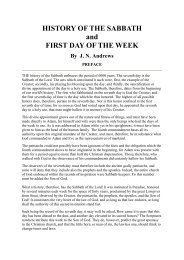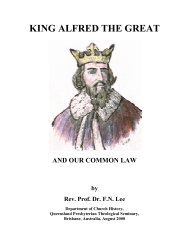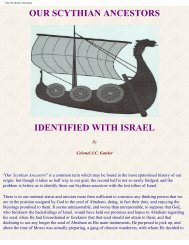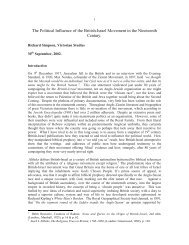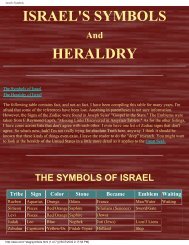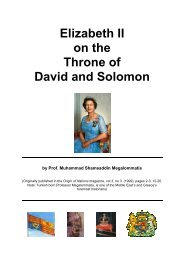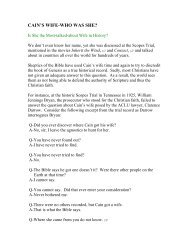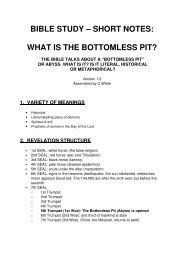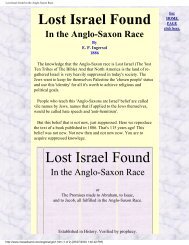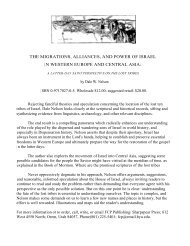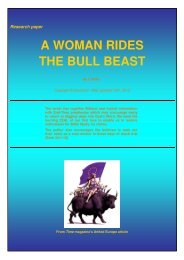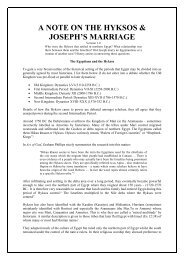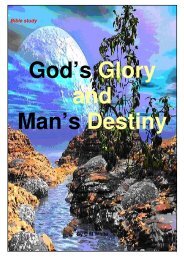The Throne of Britain: Its Biblical Origin and Future - Origin of Nations
The Throne of Britain: Its Biblical Origin and Future - Origin of Nations
The Throne of Britain: Its Biblical Origin and Future - Origin of Nations
Create successful ePaper yourself
Turn your PDF publications into a flip-book with our unique Google optimized e-Paper software.
Whatever we do, we must be careful not to treat the chronicles <strong>of</strong> Irel<strong>and</strong> or those <strong>of</strong> other<br />
nations as Scripture too—expecting them to be infallible. On the contrary, they may contain major<br />
blunders <strong>and</strong> even be all mixed up as we’ve seen. Some <strong>of</strong> Irel<strong>and</strong>’s history derives from bardic oral<br />
traditions. It is just not reasonable to place too much stock in everything they have to say.<br />
Yet it should encourage us that, in sifting the information, it can be reconciled with the general<br />
underst<strong>and</strong>ing we have. And what underst<strong>and</strong>ing is that In this case—based on scriptures explaining<br />
Jeremiah’s commission <strong>and</strong> extrapolating backward from clearly fulfilled Bible prophecy regarding<br />
the identity <strong>of</strong> Israel today—that Jeremiah must have gone to Irel<strong>and</strong>, that he took one <strong>of</strong><br />
Zedekiah’s daughters at least part <strong>of</strong> the way, <strong>and</strong> that she must have married into what was or what<br />
became the Irish royal line (either in Irel<strong>and</strong> itself or in Spain or somewhere else in the process <strong>of</strong><br />
transferring the throne to Irel<strong>and</strong>).<br />
It frankly doesn’t matter if this fact is nowhere accounted for in the Irish annals. Of course, we<br />
would expect it to be—<strong>and</strong> it seems likely that it was, based on what we’ve seen. But perhaps<br />
Jeremiah <strong>and</strong> the Hebrew princess are not mentioned as being in Irel<strong>and</strong> at all. Perhaps her marriage<br />
into the throne <strong>of</strong> Irel<strong>and</strong> was accomplished with little or no fanfare at all. No matter.<br />
<strong>The</strong> important thing to realize is that the prophet was there—<strong>and</strong> that Zedekiah’s daughter did<br />
marry into the Milesian royal line. Otherwise Jeremiah went to a great deal <strong>of</strong> trouble for no reason<br />
at all. Moreover, God said through Ezekiel that it would be done—<strong>and</strong> He used the same language as<br />
that in Ezekiel’s prophecy to describe Jeremiah’s commission. We may safely assume then—if we<br />
believe God—that Jeremiah completed the transfer <strong>of</strong> the Davidic throne from Judah to Israel. And if<br />
we accept the prophecy about the three overturns as valid, then Jeremiah must have secured the<br />
marriage <strong>of</strong> Zedekiah’s daughter into the royal lineage <strong>of</strong> Irish kings.<br />
Our pro<strong>of</strong> rests on God’s Word <strong>and</strong> verifiable history. We must accept these sure facts as a solid<br />
foundation. Irish traditions <strong>and</strong> fragmentary historical details can then be viewed in this light—<strong>and</strong><br />
that indeed does seem to fill in some interesting <strong>and</strong> supportive details.<br />
We may repeat the words <strong>of</strong> F.R.A. Glover, who wrote at length about this subject in the 19th<br />
century: “I have . . . no desire to encumber my hypothesis, with any argument, as to whether the<br />
Ollam Fodhla <strong>of</strong> Irish Tradition is, or is not a mistake for Jeremiah the Prophet. I feel that the case<br />
<strong>of</strong> the presence <strong>of</strong> the illustrious Seer in Irel<strong>and</strong> is made out on other grounds; that, indeed, he must<br />
have been the transporter <strong>of</strong> the Stone [<strong>of</strong> Destiny], the conductor <strong>of</strong> ‘the King’s Daughters’ <strong>and</strong> the<br />
planter <strong>of</strong> the St<strong>and</strong>ard <strong>of</strong> Judah, in Irel<strong>and</strong>. I was satisfied <strong>of</strong> this, long before I heard a word <strong>of</strong> the<br />
Legend, <strong>of</strong> his having been Instructor to the great warrior Finn McCoyle, or even <strong>of</strong> the existence <strong>of</strong><br />
this Ollam Fola” (Engl<strong>and</strong>, the Remnant <strong>of</strong> Judah, <strong>and</strong> the Israel <strong>of</strong> Ephraim, 1861).<br />
Other sources <strong>and</strong> a caution<br />
Yet Glover nevertheless made a strong case for the identification <strong>of</strong> Ollam Fodhla as Jeremiah.<br />
His work is available on-line (www.abcog.org/glover.htm)—as are many other articles <strong>and</strong><br />
publications on this whole subject <strong>of</strong> the transfer <strong>of</strong> the throne <strong>of</strong> David to the British Isles. Another<br />
is Judah’s Sceptre <strong>and</strong> Joseph’s Birthright by J.H. Allen, first published in 1902<br />
(www.giveshare.org/israel/judah).<br />
One major source, already cited, is <strong>The</strong> Royal House <strong>of</strong> <strong>Britain</strong>: an Enduring Dynasty by W.M.H.<br />
Milner. First published in 1902, this book has gone through numerous reprintings. It is available t o<br />
order from <strong>The</strong> Covenant Publishing Co., Ltd., in London (www.britishisrael.co.uk/booklist.htm). For<br />
a more recent work, see <strong>The</strong> <strong>Throne</strong> <strong>of</strong> David by Peter Salemi (on-line at www.britishisrael.ca/David.htm).<br />
Please bear in mind that the recommendation <strong>of</strong> outside sources for further<br />
study is not an endorsement <strong>of</strong> everything contained within those sources.<br />
For those interested in the Irish king lists <strong>and</strong> annals, many <strong>of</strong> them are now available over the<br />
Internet (see www.magoo.com/hugh/irishkings.html <strong>and</strong> related links). However, it should be noted up<br />
front that, as already mentioned, these are rather confused records. And they do not contain all the<br />
information available on the various characters that have been mentioned. Some material is derived<br />
from the various clan pedigrees <strong>of</strong> Irel<strong>and</strong> <strong>and</strong> Scotl<strong>and</strong>—as well as traditional rhymes, poems, songs<br />
<strong>and</strong> stories, some <strong>of</strong> which have been passed down by word <strong>of</strong> mouth.<br />
Furthermore, a word <strong>of</strong> caution is in order regarding such material <strong>and</strong>, frankly, many other<br />
aspects <strong>of</strong> this study. <strong>The</strong> apostle Paul said that Christians should not “give heed to fables <strong>and</strong> endless<br />
genealogies, which cause disputes rather than godly edification which is in faith” (1 Timothy 1:4).<br />
This doesn’t mean we’re to have nothing to do with genealogies—for they are found throughout<br />
- 19 -



